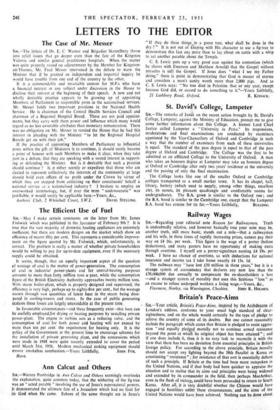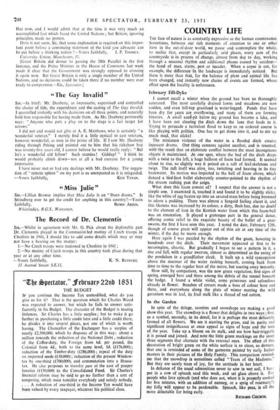Britain's Peace-Aims
SIR—Your article, Britain's Peace-Aims, inspired by the Archdeacon of London's address, conforms to your usual high standard of clear- sightedness, and on the whole would certainly be the type of pledge to relieve the country of some of. its doubts. But one cannot reasonably include the paragraph which states that Britain is pledged to resist aggres- sion "and equally pledged morally not to continue armed resistance beyond the point at whiiVits original object has been attained" ; and if one does include it, then it is no easy task to reconcile it with the view that there has been no deviation from essential principles in British foreign policy. For according to the above principle, Britain morally should not accept any fighting beyond the 38th Parallel in Korea as constituting " resistance" ; for resistance of that sort is essentially defiant of such a principle. If Britain at the time had been more outspoken in the United Nations, and if that body had been quicker to appraise the situation and to realise that its aims and principles were being widened and extended by its commander in the field, then perhaps MacArthur, even in the flush of victory., could have been persuaded to return to South Korea. After.all, it is very doubtful whether the Chinese would have engaged in hostilities wider these circumstances, and the aims- of the United Nations would have been achieved. Nothing can be done about
that now, and 1 would admit that at the time it was very much an accomplished fact which faced the United Nations ; but Britain, ignoring principles, made no protest.
Dots it not seem, Sir, that some explanation is required on this impor- tant point before a convincing statement of the kind you advocate can !Great Britain did demur to passing the 38th Parallel in the first instance, and the Prime Minister in the House of Commons last week made it clear that the Government was strongly opposed to crossing it again now. But Great Britain is only a single member of the United Nations, and no decisions could be taken there if no member were ever ready to compromise.—ED., Spectator.]







































 Previous page
Previous page